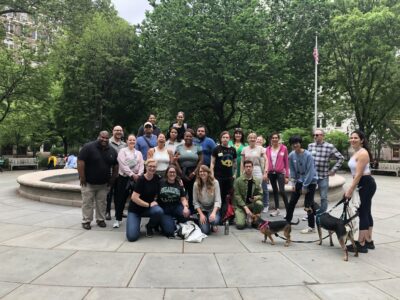Government social — it’s the broccoli of the internet.*
My name is Rebecca Lopez Kriss, I am currently interim deputy revenue commissioner for the Philadelphia Department of Revenue. I’m here to share some of the insights the department has gathered from using video in social media over the last year. Keep in mind that I work in an organization that is challenged by an inherent aversion to risk, an inability to be funny, and a topic that people rate slightly higher than death.
The Philadelphia Department of Revenue is tasked with collecting the taxes, fees and water charges that fund the City of Philadelphia and School District of Philadelphia. We collect the money that pays for clean drinking water, public safety, education, trash and snow removal, parks, etc.
Even if you agree with what we do in the abstract, when it gets down to it, your basic interaction with us is not pleasant. By law, you have to give us your money.
This makes for a difficult message to deliver, especially on the internet. Because the internet doesn’t care about taxes being the driver of civil society. The internet cares about information that is the equivalent of high-fructose corn syrup and Doritos.
Do you know who is embodiment of high-fructose corn syrup and Doritos on the internet? Gritty.
Do you know what the Philadelphia Department of Revenue embodies on the internet? Broccoli.
We’re not the Department of Parks and Rec, with pictures of smiling children, or the Free Library of Philadelphia with guests and events that are so great they sell themselves, or even the Philadelphia Zoo, with cute baby animal pics. No one wants us to joke about their taxes, and we don’t have particularly visual content. What is a scrappy, decidedly unfunny, government agency to do?
We did the most Philly thing a Philadelphian can do: Embrace who we were and keep moving. (Cue: “No one likes us, we don’t care! We’re from Philly…”)
That was our first insight: Be honest about who you are, your message, and why what you’re doing will benefit your audience.
Our first project was to conquer YouTube. In April 2018, the department launched a YouTube channel: www.youtube.com/philarevenue. (Subscribe already.)
This is an intentionally simple operation. Every video we create is made with open source video editing software, about $400 worth of equipment and a City-issued cell phone.
For YouTube we create how-tos, like how to fill out specific tax forms, interviews with subject matter experts, and we republished previously recorded Facebook live videos. We’ve published over 60 videos.
What performed the best was surprising:
- Rehashing Facebook live videos garnered very few views.
- Interviews with subject matter experts or pros, like how to read your water meter, did better.
- Links to how-to videos, like this demonstration of our eFile/ePay site, that we emailed directly to taxpayers did relatively well.
- A video going line by line through a tax form did the best.
Can you believe that over 1,400 people have watched a video going line-by-line through the School Income Tax form? It is our highest performing video by over 600 views. Most of those views came just before the April 15 filing date. Either a lot of people needed help going to sleep during the first two weeks of April, or residents of Philadelphia really want to figure out this often misunderstood tax.
Insight two: Understand the exceptions, because sometimes the metrics aren’t what they seem.
The scale of our audience is different. For example, we have contact information for about 200 select tax preparers, out of about 100,000 Business Income and Receipts taxpayers.
It might seem silly if I create content that is tailored to an audience of 200. But what if I told you that this tiny group of people files over 20,000 Business Income & Receipts Tax returns, a full fifth of all BIRT returns the City receives? Reducing error rates and increasing compliance for this select group goes a long way.
We know that we’ll never create videos that eclipse a pastry chef making Lucky Charms, but we know that we can have a measurable impact that can increase compliance and save taxpayer money.

(Image courtesy of the City of Philadelphia)
Our next project was to improve our Facebook engagement (also known as what happens if CSPAN and “Wayne’s World” had a baby). In 2017 and 2018 our Facebook engagement was terrible, even for government. We felt like we were just talking to other government agencies and community groups.
We decided that 2019 was going to be better. We started posting more photos. We tried to do more topical, graphic posts. But mostly, we looked back at insight one (to thine own self be true).
We thought we would try consistent live video. If only other civic groups and government agencies are paying attention, let’s talk to them specifically. Why not create content that will educate the groups that work directly with taxpayers? We wanted to create a library of video that outside partners and stakeholders could use to reference taxpayer assistance programs.
We went live every Friday through the tax season (January 2, 2019, through April 15, 2019), and we called it the Revenue Rundown. We were honest with our audience that this was an experiment. We invited guests every week that tied into our blog content (which tied into our social posts), which tied into our major messages for the season. Which leads to insight three.
Insight three: You MUST have an editorial calendar to stay organized, consistent and on point.
We have developed a six-month editorial calendar that includes a weekly topic and outlines what strategy we’re going to use (blog, social platform, video, white paper, etc). This document lays out important planning details, like who is the subject matter expert and tie-ins to other events.
It’s also the thing that helps us show the diversity of the department — not only the racial diversity of our subject matter experts, but also diversity in the themes that show all the work of the department. An editorial calendar also helps us plan for language access. (We’re consistently blogging in Spanish, and have published several multi-lingual videos.)
Our editorial calendar is the thing that ensures we tell all the stories that Revenue is trying to tell and without it we would just be wandering in the dark.
Which leads to insight four: Internet video may be the wild west, but you still need to invest smarts.
Video content takes a lot of organization. We might be doing this on a shoestring budget for equipment, but we have a full-time person devoted to our digital content. Our digital content manager writes a run of show for every video that includes an equipment list, location scouting, and talking points for both the host and guest. We often rehearse with our subject matter experts to make sure they feel comfortable.
If your organization wants to create video, you need to be prepared to invest the time it takes to write quality content. Although the internet may forgive poor production values, they will simply ignore bad content.
At first, it didn’t seem like anything was happening with our Facebook Live experiment. The number of views while we were live were in the tens.
But then we realized that a lot of people were looking at our videos after the fact. Year-over-year monthly engagement improved significantly.

(Chart via the City of Philadelphia)
For us, this is a big deal.
Also, other agencies started to notice. We got a phone call from an elected official asking to be on “our show.”
The totally boring, risk-averse Department of Revenue unwittingly set the bar for live engagement for the City of Philadelphia. We’ve since shared our setup with another department so they can try live video too. I don’t have metrics to prove it, but I think our videos are likable because they humanize the department and create a genuine connection to taxpayers.
Insight five: Broccoli might not be fun, but it is good for you.
Being broccoli doesn’t have to be bad. In fact, it was the sixth most popular fresh vegetable among consumers in 2017. One cup of broccoli provides a high percentage of your daily requirement for vitamin C and K and is a good source of fiber.
The content that we provide, while never funny or viral, helps folks fulfill their legal obligation to pay taxes. And we can see that the boring content that we provide is what people want. After all, taxes are the single thing that every person in this country does to contribute to society.
Remember why you’re doing this.
For-profit organizations can easily see conversion rates. But it can be really hard for nonprofits or government agencies to know if what they are doing is working.
So, I try to keep this in mind:
We believe in government and the idea that if we pool our resources, we can improve daily life for everyone in Philadelphia. When everyone pays their fair share, we all benefit from clean water, public safety, education, nice parks and trash removal. The vast majority you and your neighbors believe this too: In Philadelphia, over 96% of real estate taxes are paid in the year they are billed and over 90% of business taxes are paid on-time and in-full.
While I won’t have a direct conversion stat for our social media (yet), collection rates in Philadelphia are going up, while delinquency is going down. We think that sharing a consistent message and story is contributing to these positive trends.
_
*I wish I could take credit for this joke. Brian Rademaekers at the Philadelphia Water Department said this in a meeting. He was asking a representative from Facebook if government agencies received special consideration in the Facebook algorithm, since, you know, our content is like the broccoli of the internet. The representative politely said, “no.”
Join the conversation!
Find news, events, jobs and people who share your interests on Technical.ly's open community Slack

Philly’s IT department fires long-tenured staff amid a high-level shakeup of priorities

Why is it so hard to find entry-level software engineering jobs?

This Week in Jobs: Get out there with 22 new job opportunities available to you!


